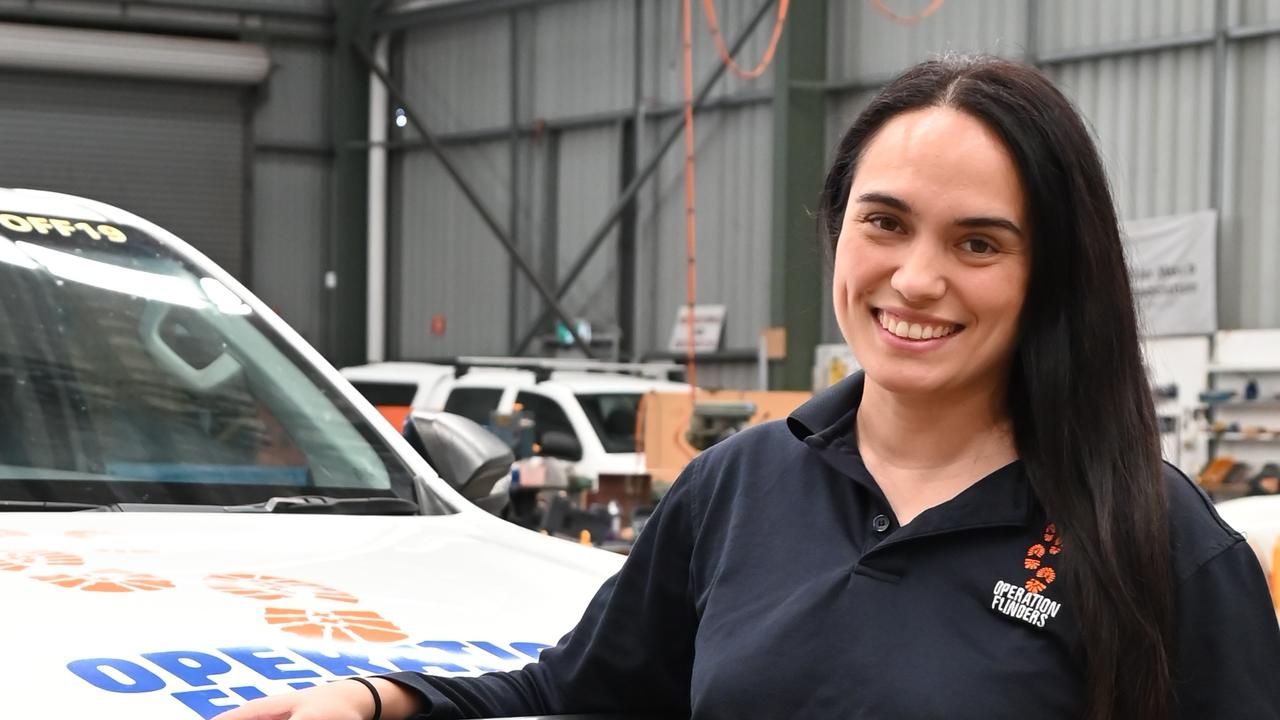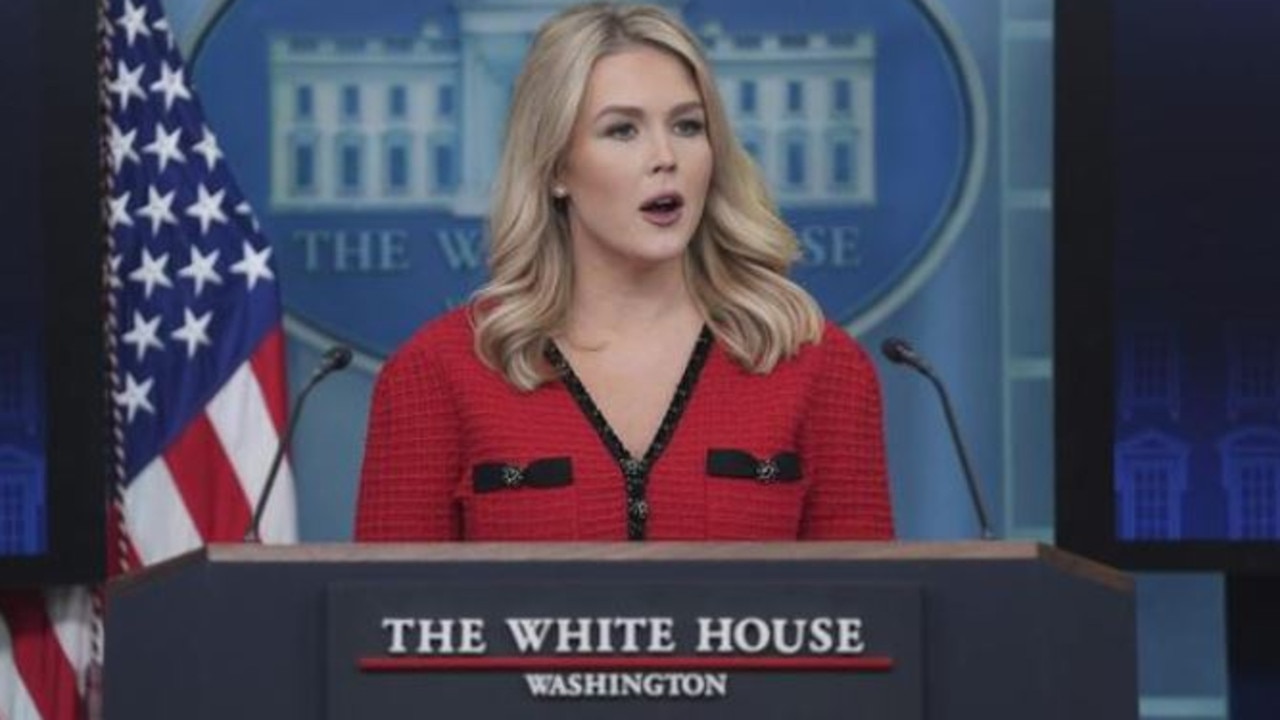Bruce Djite’s clarion call: ‘Wake up, Adelaide ... this is embarrassing’
Bruce Djite says his adopted hometown is a place that used to have everything – and it can have it all back if we change our mindset.
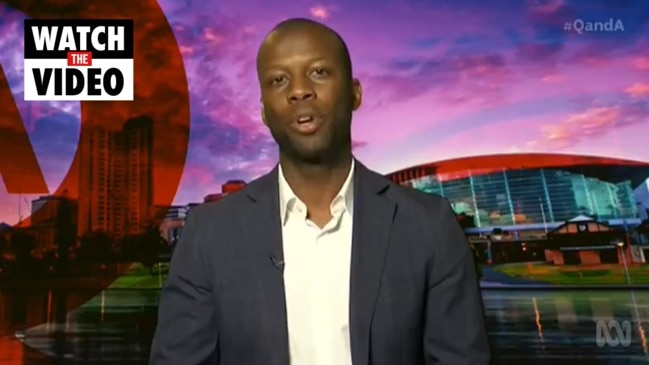
SA Weekend
Don't miss out on the headlines from SA Weekend. Followed categories will be added to My News.
Bruce Djite is slamming his hand on the table to reinforce his point. Djite is talking with passion about Adelaide and South Australia. The interaction between his hand and the solid surface a physical representation of his frustration that his adopted city can sometimes cause him. It’s not that he doesn’t love the place, he does, it’s just that he feels it’s not fulfilling its potential and possibly never will.
“(Adelaide is) the most reluctant place to change that I’ve ever lived so that’s why I’m so passionate,’’ Djite says.
For years, Djite was best known as a professional footballer. His career started at Adelaide United, before taking him on a wandering journey that saw him also play in Turkey, China, South Korea and Indonesia before retiring in 2018. He also played for Australia.
But last year he stepped away from the game, swapping his role as football director at Adelaide United to become chief executive at the Committee for Adelaide, an advocacy group that has been around for a decade, but whose purpose still seems obscure.
Djite was born in Washington DC where his parents Paulin and Lyn Williams were working. His father is from Ivory Coast, while his mother was born in Togo. He grew up with French as his first language. The family moved to Sydney when Djite was two and that’s where he grew up until he moved to Adelaide to play for the Reds in 2006. He remembers what he learned about Adelaide when he arrived.
“Everyone was like, ‘We had that, we had that, we had that’,’’ he says. “What happened to you guys? Sleeping at the wheel? You seem to have had everything and you don’t have it anymore.
“You lost the Grand Prix? Who was the last city to lose a Grand Prix to another place within the same country?”
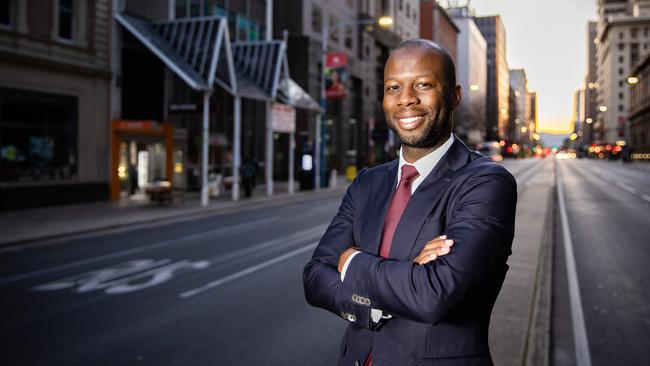
As head of the Committee for Adelaide, he has already advocated for the city to grow its population to two million and for foreign students to be allowed to stay.
The word vibrancy gets a regular airing and 35-year-old Djite expresses something approaching contempt for the veneration given to Adelaide’s supposed status as one of the world’s most liveable cities. He notes accurately that some of the chest-beating that occurred after one ranking had Adelaide as high as third in its list, quietened after the city to fell to 30th in the most recent survey. It’s almost as if it’s a worthless measure of any city.
“Why does everyone want to go to New York?” he asks. It’s exciting? “Exactly. Not because I can be on the subway and be home in three minutes. I know the type of people who want to do that and it’s not the people who start companies that end up being worth over a billion dollars.
“Elon Musk isn’t saying he wants to live somewhere because it’s just easier to be there. Steve Jobs didn’t do that either. Bill Gates ain’t doing that either. They’re the type of people we want to keep or to attract. They’re not excited by getting the tram home in five minutes.”
Djite knows the objections to the argument for a bigger city. The roads will become clogged. Hospitals and schools will be overrun. But he counters that more people will lead to higher economic growth, more jobs, more revenue for governments to build things like roads and hospitals. Djite says he’s not asking for much. What he wants is for South Australia to at least match the other states when it comes to statistics. To match the national average when it comes to economic and jobs growth. “Can we just keep up, because failure to do so means you’re going backwards,’’ he says. And keep young people in the state for longer. “How can you have a brain drain for 32 years? It’s embarrassing.”
And we also can’t rely on the “tourism” approach and believe having good wine, for example, is a draw for businesses when deciding where to start a company or establish a head office
“Why are you coming to live and work here? Sorry Barossa, because I spoke to a French person about that and they laughed because they’re from Bordeaux,” he says.
This, he says, is the role for the Committee for Adelaide. To advocate and agitate to build a bigger, more energetic city. As its website says, to “shape the future of greater Adelaide”.
It does have some heavy hitters on its board. Its chair is University of South Australia vice chancellor David Lloyd. Alicia Genet is a senior executive at Santos. Trevor Cooke is chief executive of Commercial and General, the state’s largest private developer. Its members include BHP, Bank SA and Thomas Foods. Djite took over the Committee in July last year. It was a big break for Djite. A sense of disillusionment had set in at Adelaide United. Money was always tight and he felt the outlined vision that convinced him to return to the club as football director had turned into a mirage.
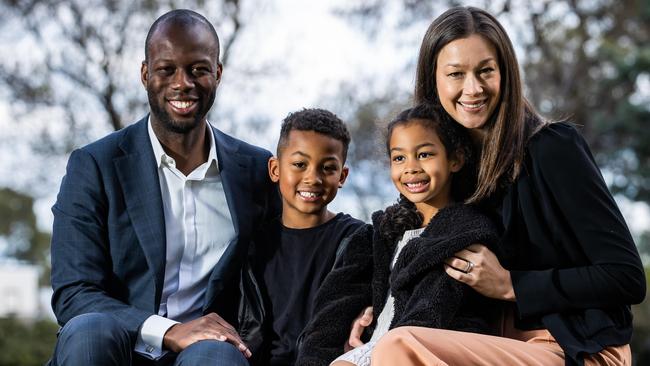
Football lasts you for 10 years - uni’s for life
Djite says he had never wanted to be defined just by football. He took himself back to university when he was 24 when the realisation hit that “I am not going to play for Arsenal” in the English Premier League.
University versus football has always been a point of contention in the Djite household. His father Paulin is a respected sociolinguist and has published books including The Sociolinguistics of Development in Africa and From Language Policy to Language Planning: An Overview of Languages Other Than English in Australian Education.
It was during a visit to Ivory Coast in 1993 that Bruce fell in love with football. When the family returned to Sydney, the young Djite wanted to become a professional footballer.
“Bruce had to be woken up every morning to go to school, but he’d be the first one at your bedside early in the morning on Saturday or Sunday, because he didn’t want to be late for his game,” Paulin says.
His parents encouraged him, driving him on the hour round trip from their home on Sydney’s North Shore to the NSW Institute of Sport at Parklea, six days a week. Djite was at Macquarie University studying sport psychology when he was offered a place at the Australian Institute of Sport.
“I wasn’t in favour of it,” Paulin recalls.
There are three Djite boys and the family had been saving since they were young to send them to university. Younger brother Sidney is a vice president at Goldman Sachs in New York. Older brother Paul-Simon is an entrepreneur, who is heading back to Sydney after 13 years in New York and six months in Ivory Coast. They held a family meeting to discuss the offer from the AIS.
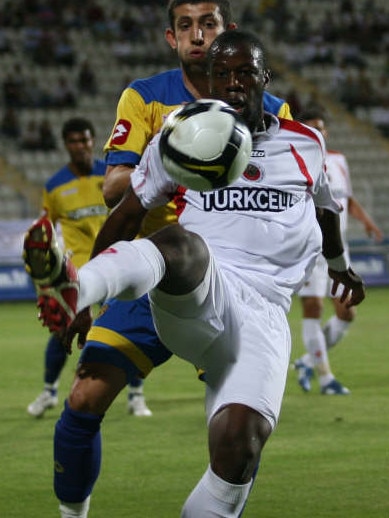
“My position was that football will last you for up to 10 years, if you’re lucky, but a university degree will last you for a lifetime,” Paulin says. “His brothers convinced me that we were not all going to be academics in the family, that Bruce didn’t just love football, he was pretty good at it, and this was a chance for him to excel.”
Paulin accepted the majority decision, but added a caveat. “You have two years to be drafted in a professional team; otherwise, you go back to university.”
Bruce Djite’s argument at the time was that he was spread too thin. “I would be like you don’t get great reward without taking great risks,” he says. “I have to put all my eggs in this basket. I can always do education later.”
It wasn’t all smooth sailing. Djite played for the Australian under-20 team under now Celtic coach Ange Postecoglou and was also spotted as a rising talent by former Adelaide United coach John Kosmina. Under the rules at the time, Kosmina initially couldn’t sign Djite on anything but short-term contracts. That meant Djite would land in Adelaide for a month, before being sent back to Canberra. At one stage it came down to a shootout between Djite’s good mate Nathan Burns for the last spot on the list. Burns won the contest.
Kosmina remembers that Djite always had a “great attitude”. There were other more naturally talented players but few worked as hard on their game. “It’s part of his nature as well, whatever Bruce does he applies himself, there’s no short cuts with Bruce, he’s got a great work ethic. Ambitious is a good way to describe him as well. He doesn’t suffer from a lack of self-esteem.”
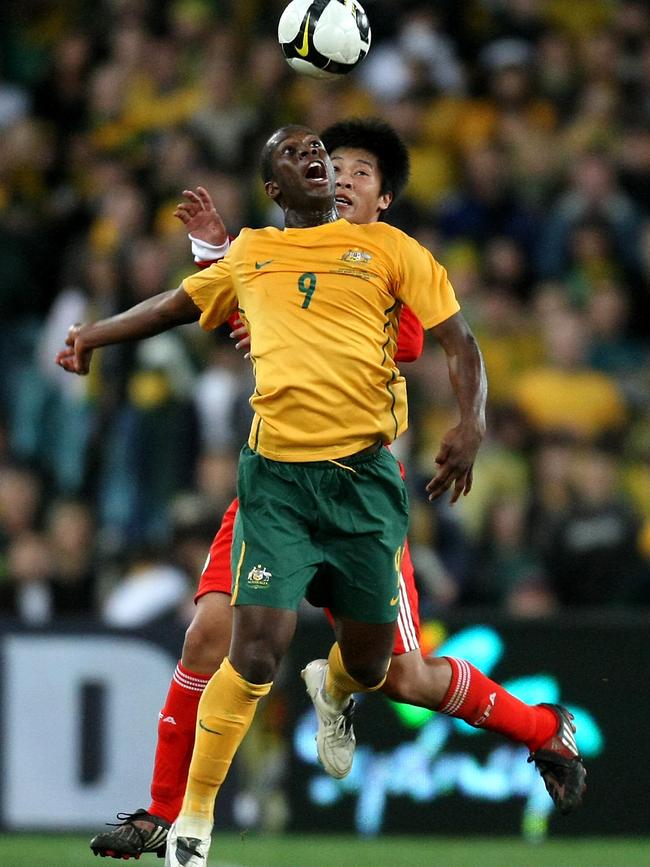
Djite talks with great fondness of his time playing for Adelaide. Under the ownership of the Bianco family there was a “really family atmosphere”.
“They were the best days, even after winning the grand finals the vibe wasn’t the same in the club as those days.”
Djite’s first full-time playing contract with Adelaide was worth $50,000 a year, but he grabbed attention quickly and by 2008 a club in Turkey was offering to buy him for the Reds for $850,000. Turkey was a tough place to go but by this stage he was making national squads alongside legendary Australian players such as Harry Kewell and Tim Cahill and he believed it could be a stepping stone to a bigger league such as England, Spain or Italy. He started well at Genclerbirligi, scored a few goals, but picked up injuries and then the coach was fired and the next one didn’t rate him. Djite was in Turkey for two seasons before heading back to Australia to play for Gold Coast United – a club owned by Clive Palmer. “He was eccentric, but nowhere near what he is today.” Djite says of Palmer. “I think he puts it on a bit to be honest. He’s really smart, really savvy, business orientated.”
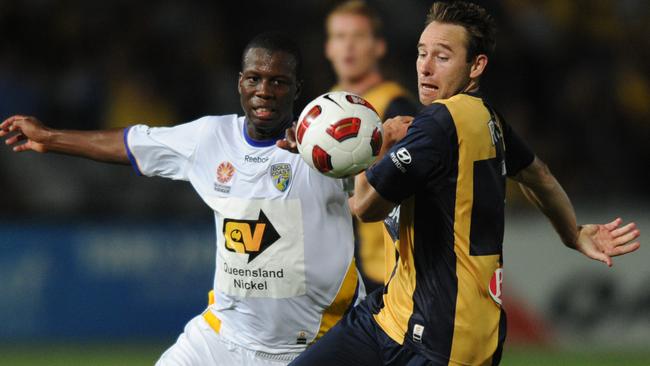
It was while at the Gold Coast, the thoughts of study reappeared. He understood he could have a decent career in football but he knew, at the age of 24, he wasn’t going to the top.
“I was always a realist,” he says. “I can still strive for things, obviously, but I’d seen the level. I’d played Socceroos against Holland.”
So he started studying Bachelor of Business at Griffith University. After the Gold Coast he returned to Adelaide and was part of the premiership winning team in 2014, playing in the grand final in front of more than 50,000 fans at Adelaide Oval. There was another stint overseas after that grand final in South Korea, before his career wound down in Indonesia. He retired at 31.
“I was finishing my studies. I was getting more interested in geopolitics, management, finance. They were my three passions I was more interested in than football,” he says. “After about four months (in Indonesia), I’d be at training and thinking ‘what am I doing here?’ When’s training finishing? This is shit.”
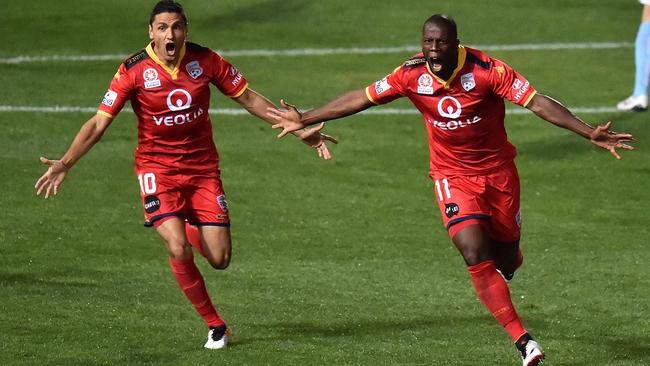
Reds’ financial shambles - and what he learnt
His first post-career home was in Sydney. He did some media work but then was approached by the new chairman of Adelaide United Piet van der Pol about moving back to the Reds as football director.
He was sold a picture of Adelaide United forming part of a global structure that would include clubs in China and Europe. He joined despite not knowing, and never finding out, who owned the club. Money was always tight. Sometimes it was “crazy, embarrassing stuff” like having to negotiate to feed players at airports. Or after star player Craig Goodwin was sold for $500,000, when Djite asked for $50,000 to organise a pre-season camp in Canberra and was told there was no cash.
“The club was a shambles, a shambles, financially. Everything was hard,” he says.
Then there was Covid. More players were sold, those that remained went on Jobkeeper. Djite says he had to be creative. He insisted on a sell-on clause for Riley McGree when he was sold to a US club so that when the former Red was subsequently moved to English team Middlesbrough, Adelaide were due a cut of the $5m transfer fee.
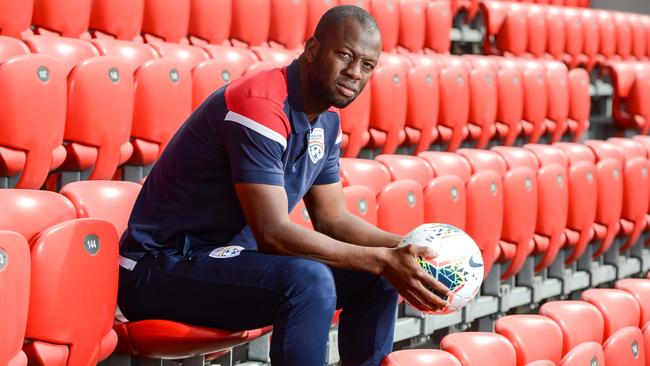
Djite says he viewed working at Adelaide as a “real-life MBA” but then a chance meeting with a headhunter at the wedding of former Port Adelaide player Brett Ebert sent him in a new direction. He was told he should apply for the vacant chief executive job at the Committee for Adelaide. He didn’t think he would get it but thought going through the process would be an education. He spoke to business and political consultant Ian Smith and property developer Theo Maras, both of whom Djite regards as mentors. Their advice?
“Football is football, but football is still small, it’s not AFL. What’s your next step from there?”
Djite had already been thinking about the future. He didn’t want to be pigeonholed as only being useful in football, “especially with this lack of open-minded state we live in”.
Smith met Djite in 2013 when he was on the United board. He was immediately impressed.
“He just had a lot of interests beyond football, that was clear,” he says. “He was confident on the pitch obviously and I think that same self-confidence is demonstrated off it.” Smith is well connected within the Liberal Party and his relationship with Djite led to speculation the former footballer would enter politics.
Smith says offers have been made to Djite, and not necessarily just from the Liberal side. “We have a bit of a chat every now and then around the lure of politics, but I don’t think it was for him. I think he chose the right path,” Smith says.
Djite confirms he was approached by the Liberals but is quick to mention that “Labor has some really good people”.“Libs have got some good people too but I’m friends with everyone,” he says. Djite also makes the reasonable point that there’s “one team in this state” and it’s Labor who has been in power for all but four years since 2002.
One of Djite’s concerns when he took the Committee for Adelaide job was he could get bored or his work would be ignored.
He says it hasn’t been like that. Financially, the committee was struggling and that had to be addressed. New websites have been launched, new members secured and new policies launched. His profile is also attracting abuse from racists, including one who sent him a column he’d written for The Advertiser about growing the city with the words “black ----” written on it. “It is not something that happens to me often, however, it does happen from time to time,” Djite says. “It is far more prevalent in society on a day-to-day basis for those without as loud a voice or without a public profile. I feel this is because there is not enough attention on it and it is only blown up when it happens to someone with a higher profile.
“I do not think there are large pockets of racism, but it is certainly prevalent and whilst not overt, it is very much underlying. It simmers within people; it goes somewhat underground until something (anything) happens that triggers them. Then out they come with a racist slur or racist abuse.”
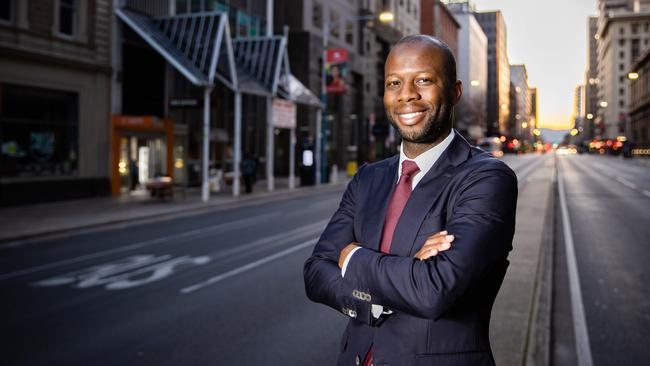
Djite says Australia “often” makes the mistake of comparing ourselves to societies with even greater racial problems.
“The real challenge is how can we change the deep-rooted mindset and societal constructs on which racism is built,’’ he says.
Education is one key, but a broader campaign that doesn’t seek to lay blame on individuals is also vital. “A campaign that may help shift the dial, could be a campaign that create a movement that gets people thinking, questioning and asking themselves whether a thought or something they say is racist or not is more than needed,” he says.’
Djite sees himself doing this job for the next five to seven years. He’s happy here with wife Amy and their two children Elijah, 7, and Aalia, 5.
“I’m ambitious to fulfil my potential as well,” he says. “People ask me what’s next and I don’t know.”
In the meantime, he’s going to keep banging the drum for Adelaide. He’s banging that hand again. “We never get the marquee events, they always go to Sydney, Brisbane, Melbourne.”
He rejects the notion that happens because of an eastern states’ bias. “Can we do a comparison about investment in facilities? They put their money where the mouth is, so they deserve it. You need more people doing more things that generate money privately and publicly, to then be able to afford to pay the money required to be competitive in a global market.”
Djite reaches for a football metaphor to illustrate the opportunities for Adelaide. He compares the city to Lionel Messi. At 16, Messi had the world ahead of him. A marvellous talent, tipped as a star, but still only 16. And even prodigies sometimes don’t fulfil their promise. Djite wants Adelaide to become the 32-year-old Messi. A world beater. But it’s not there yet.
“We’re not going to be New York. We’re not going to be London. We’re not going to be Sydney. We’re not going to be Melbourne. We don’t want to be that. But can we carve out our own niche.”

